情态动词复习[下学期]
图片预览

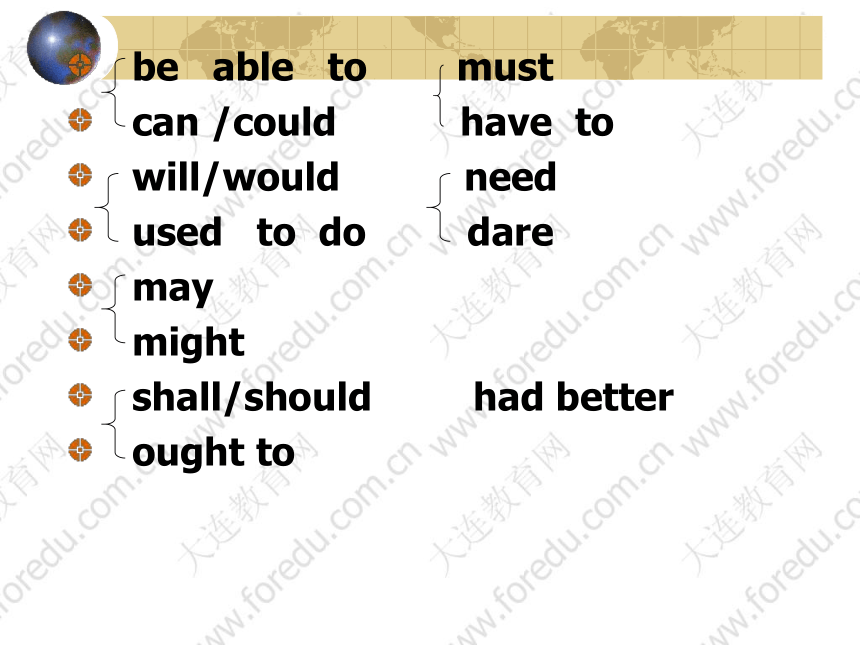

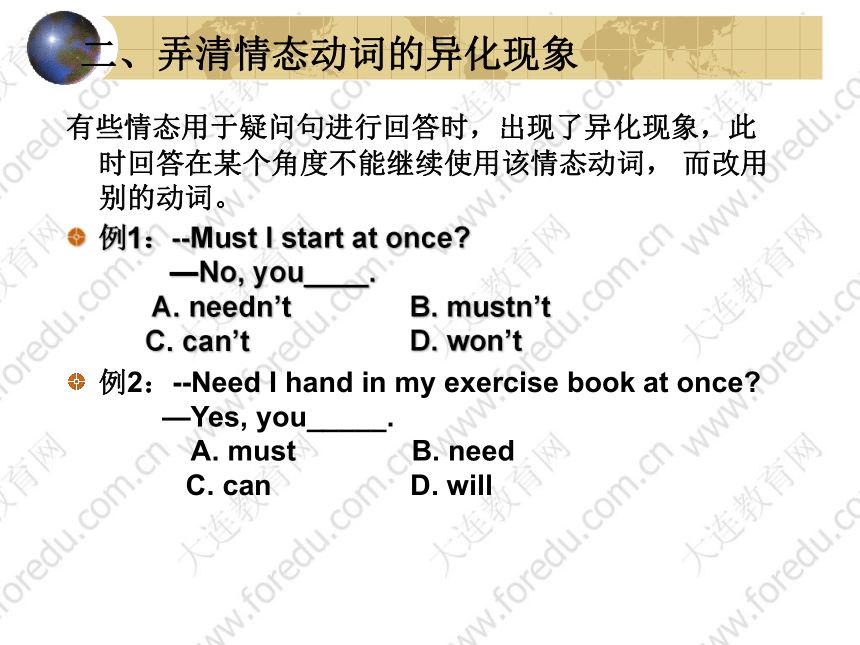
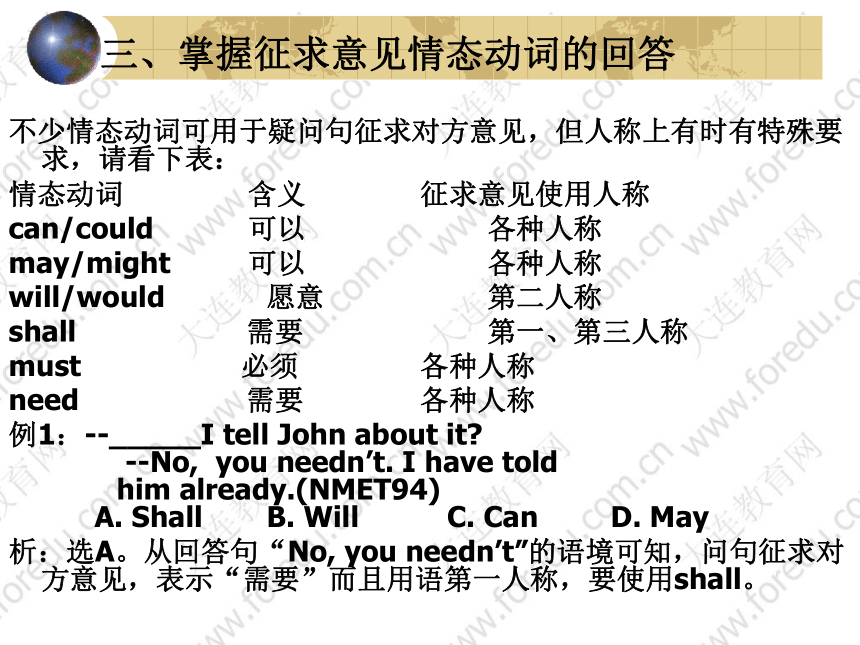

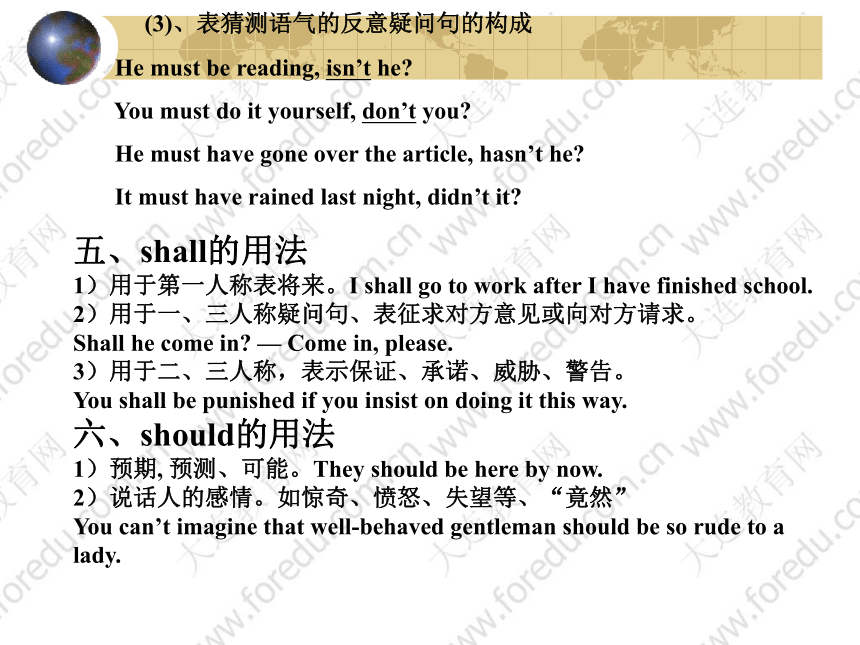
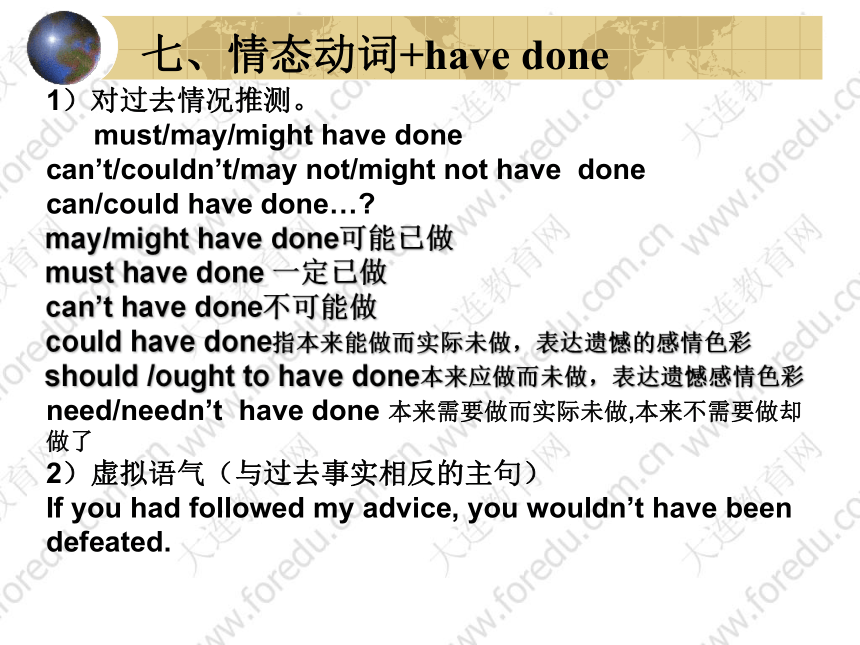
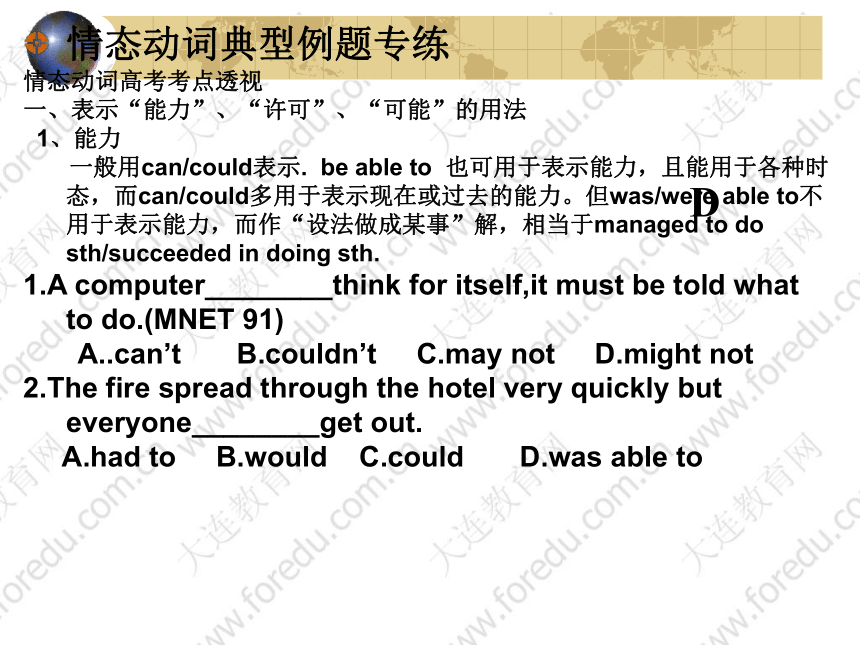
文档简介
课件29张PPT。情态动词
的用法 be able to must
can /could have to
will/would need
used to do dare
may
might
shall/should had better
ought to一、熟悉情态动词委婉用法:
could, would, might等情态动词均有委婉用法,它们不是过去式而是表示语气委婉、客气、礼貌,常用与疑问句,并多用于习惯表达, 如would you please, would you mind, would you like to等,might还可以用于肯定句表示推测,表示可能性小, might和could表示征求对方意见时,回答必须还成may, can.
1:--Could I borrow your dictionary?—Yes, of course you____. A. might B. will C. can D. should
析:选C。该句用can的委婉表达式could 来征求对方意见,could 和might通用,但回答时必须还成can或may,因此该题不选A.
2. Would you like to do it for me ? Yes. I would.
二、弄清情态动词的异化现象有些情态用于疑问句进行回答时,出现了异化现象,此时回答在某个角度不能继续使用该情态动词, 而改用别的动词。
例1:--Must I start at once? —No, you____. A. needn’t B. mustn’t C. can’t D. won’t
例2:--Need I hand in my exercise book at once? —Yes, you_____. A. must B. need C. can D. will三、掌握征求意见情态动词的回答
不少情态动词可用于疑问句征求对方意见,但人称上有时有特殊要求,请看下表:
情态动词 含义 征求意见使用人称
can/could 可以 各种人称
may/might 可以 各种人称
will/would 愿意 第二人称
shall 需要 第一、第三人称
must 必须 各种人称
need 需要 各种人称
例1:--_____I tell John about it? --No, you needn’t. I have told him already.(NMET94) A. Shall B. Will C. Can D. May
析:选A。从回答句“No, you needn’t”的语境可知,问句征求对方意见,表示“需要”而且用语第一人称,要使用shall。
(1) 对现在或将来情况推测:must +动词原形。
must只能用于肯定。否定和疑问分别用can’t和can。
He must tell a lie. Can he tell a lie ? He can’t tell a lie.
*Must-should/ought to –may-might/could+do
可能性依次减弱
(2) 对过去情况推测:must (may, might)+完成时。
You must have met him before.
must—may—might可能性依次减弱
must只能用于肯定句,译成“一定”。否定和疑问分别用can’t / couldn’t和can / could。
Could /Can it have happened last night ?
It couldn’t/can’t have happened last night. 四、推测语气
情态动词 含义 适用句型
May/might 可能,或许 肯定句
Must 一定,必须 肯定句
Can/could 可能,或许 否定句,疑问句 (3)、表猜测语气的反意疑问句的构成
He must be reading, isn’t he?
You must do it yourself, don’t you?
He must have gone over the article, hasn’t he?
It must have rained last night, didn’t it?
五、shall的用法
1)用于第一人称表将来。I shall go to work after I have finished school.
2)用于一、三人称疑问句、表征求对方意见或向对方请求。
Shall he come in? — Come in, please.
3)用于二、三人称,表示保证、承诺、威胁、警告。
You shall be punished if you insist on doing it this way.
六、should的用法
1)预期, 预测、可能。They should be here by now.
2)说话人的感情。如惊奇、愤怒、失望等、“竟然”
You can’t imagine that well-behaved gentleman should be so rude to a lady.1)对过去情况推测。
must/may/might have done
can’t/couldn’t/may not/might not have done
can/could have done…?
may/might have done可能已做 must have done 一定已做 can’t have done不可能做
could have done指本来能做而实际未做,表达遗憾的感彩
should /ought to have done本来应做而未做,表达遗憾感彩
need/needn’t have done 本来需要做而实际未做,本来不需要做却做了
2)虚拟语气(与过去事实相反的主句)
If you had followed my advice, you wouldn’t have been defeated.
七、情态动词+have done情态动词典型例题专练
情态动词高考考点透视
一、表示“能力”、“许可”、“可能”的用法
1、能力
一般用can/could表示. be able to 也可用于表示能力,且能用于各种时态,而can/could多用于表示现在或过去的能力。但was/were able to不用于表示能力,而作“设法做成某事”解,相当于managed to do sth/succeeded in doing sth.
1.A computer________think for itself,it must be told what to do.(MNET 91)
A..can’t B.couldn’t C.may not D.might not
2.The fire spread through the hotel very quickly but everyone________get out.
A.had to B.would C.could D.was able toD 2.许可
一般可用may/might,can/could。
might,could 比较委婉,might一般多用于疑问句,
而 can 表达的语言比较随便,在以 could,might 表示征询对方意见或表示请求时,回答应相应使用 can,may 而不用could,might。
3.You may come at any time you like.
4.He asked if he might attend the lecture.
5.----May I use your pen?
----Yes,you can. ( No,you can’t./mustn’t.)
6.You can have the novel when I have finished it.
7.----Could I borrow your dictionary?
----Yes,of course you_________.(MET92)
A.might B.will C.can D.should3、可能
表示对目前的推测按可能性大小排为must can,could,may,might。 must 只能用于肯定句中,can只能用于否定和疑问句中。
9.Peter________come with us tonight,but he isn’t very sure yet.(MET92)
A.must B.may C.can D.will
10.-----Are you coming to Jeff’s party?
-----I’m not sure.I________go to the concert tonight.(NMET 2000)
A.must B.would C.should D.might
11. -----Where is my uncle,Mary?
-----He_________in the bedroom.
A.must have been B.must be
C.may have been D.should have been
12. Put on more clothes.You____be feeling cold with an only shirt on.
A.can B.could C.would D.must
13.----That must be a mistake. ----No,it________a mistake.
A.must not be B.needn’t be C.cannot be D.would not be
二。部分情态动词否定意义的用法
情态动词否定式的常考点有:mustn’t 禁止、严禁、不准 ;needn’t 不必要、没必要(=don’t have to) ;can’t 不可能 ;may not 可能不、或许不 ;shouldn’t不应该(=ought not to )。
14.You________return the book now.You can keep it till next week if you like.
A.can’t B.mustn’t C.needn’t D.may not15.Johnny,you_______play with the knife,you_______hurt yourself.
(NMET 96) A.won’t;can’t B.mustn’t;may C.shouldn’t,must
D.can’t;shouldn’t
三、“情态动词+动词完成形式”结构的意义
“情态动词+完成体”表示对已发生事情的推测、责备、后悔、
遗憾等,历年高考对此热点共考查过18题。不同的情态动词与
动词完成形式连用表示不同的含义,通常有下列几种情况。
1、“must +have done” 仅用于肯定句,表示对过去事情把握极大的推测。意为“必定已经……”。否定句用can’t/couldn’t +have
done,疑问句中用 Can/Could….have done?分别表示对过去事情的否定或疑问推测。
16、I didn’t hear the phone.I_______asleep.(MET 89)
A.must be B.must have been
C.should be D.should have been17.I didn’t see her in the meeting room this morning.She________at the meeting.(MET 91)
A.mustn’t have spoken B.shouldn’t have spoken
C.needn’t have spoken D.couldn’t have spoken
18.I can’t find Mr.Smith anywhere in the office building.Where_______he have gone?
A.must B.can C.should D.need
2.“should/ought to+have done ”表示“本该做的事而实际上未做”。其否定形式表示“本不该做的事但却做了”。
19.That young man has made so much noise that he_______not have
been allowed to attend the concert.(92 上海高考)
A.could B.must C.would D.should
3. “may/might +have done”表示“本可以做的却未做”,突出可能性;
而 “could+have done”表示“本能够做的但却未做”,强调能力因素。20、----I didn’t go to class last night because my car broke down.
----You______mine.I wasn’t using it.
A.could borrow B.could have borrowed
C.may borrow D.may have borrowed
4. “needn’t +have done” 表示“本不必做的事却做了”
21.There was plenty of time.She________.
A.mustn’t have hurried B.couldn’t have hurried
C.must not hurry D.needn’t have hurried
22. Johnny, you ______play with the knife, you ____hurt yourself. ( )
A. won't ; can't B. mustn't ; may
C. shouldn't ; must D. can't ; wouldn't
23.-----There were already five people in the car but they managed to take me as well.
-----It ____a comfortable journey. ( )
A. can't be B. shouldn't be
C. mustn't have been D. couldn't have been24. The fire spread through the hotel very quickly but everyone _____get out. ( )
had to B. would C. could D. was able to
25.I was really anxious about you, you_____home without a word.(NMET2001)
A. mustn’t leave B. shouldn’t have left
C. couldn’t have left D. needn’t leave
26. ------When can I come for the photos ? I need them tomorrow afternoon.
-----They _____be ready by 12 : 00 . (B )
A. can B. should C. might D. need
27. With so much work on hand, you ____to see the game last night. (D )
A. mustn’t go B shouldn’t go
C. could have gone D. shouldn’t have gone
28.They are disappointed at the English party. They say that it ___better organized. (D )
A. had been B. had to be
C. must have been D. could have been
29.She must have forgotten about the class _______? (C )
A. doesn’t she B. mustn’t she
C. hasn’t she D. won’ t she
30. See who’s there ! _______ it be Mary ? C
May B. Must C. Can D. Will
31.Jenny ____with him at that time, for I was having dinner with her in my home. (A )
A. can’t have been B. mustn’t have been C. must be D. may be
32.Tom’s father promised, “You ___have a new computer if you pass the coming examination,” (C )
A. can B. should C. shall D. may
33.---- Did you walked home by yourself last night ?
---- Yes, I did. But I think I _____. (D )
needn’t B. shouldn’t
C. may not have D. needn’t have
34.----Would you change this bucket for another ? It ______ hold water. ----- OK. I’m really sorry. A
A. won’t B. can’t C. didn’t D. doesn’t
35. You ought to have helped him with his English, __ C __you ?
A. won’t you B. ought not you
C. shouldn’t you D. wouldn’t you
36.--- I thought I ____something burning. (C )
---Really ?
A. smelled B. was smelling
C. could smell D. might smell
37. She _____out alone at night. (C )
A. dare not to go B. dares not go
C. doesn’t dare to go D. doesn’t dares go
1.shall用于一、三人称疑问句表示征求对方意见;用于二、三人称陈述句表示说话人给对方的命令、警告、允诺或威胁等;may表示“允许、可以”,语气比较委婉。
②—Excuse me, but I want to use your computer to type a report.
—You ______ have my computer if you don't take care of it.(2004湖南卷)
A.shan't B.might not C.needn't D.shouldn't
③—The room is so dirty.____we clean it? —Of course(2003北京春季卷)
A.Will B.Shall C.Would D.Do
④—I hear you’ve got a set of valuable Australian coins.______ I have a look﹖
—Yes, certainly.(北京2002春) A.Do B.May C.Shall D.Should
ABB2.must用于疑问句,表示责备、抱怨的感彩,意思为“偏偏,偏要”,mustn’t表示禁止,是说话人强有力的劝告。cannot 表示“不可能”;need not 表示“不必要”;may not 表示“可能不”。
①John, look at the time. ___________ you play the piano at such a late hour? (2005全国卷I)
A.Must B.Can C.May D.Need
②Tom , you leave all your clothes on the floor like this !
A.wouldn’t B.mustn’t C.needn’t D.may not
③—Is John coming by train﹖ —He should, but he not. He likes driving his car. (2002全国卷) A.must B.can C.need D.may
④Johnny, you ____ play with the knife, you ____ hurt yourself. (96全国卷)
A.won’t; can’t B.mustn’t; may C.shouldn’t; must D.can’t; shouldn’t
ABDB—Lucy doesn’t mind lending you her dictionary.
—She ______ . I've already borrowed one.
A. can‘t B. mustn't
C. needn‘t D. shouldn't
C
4.would表示过去反复发生的动作或某种倾向
When he was there, he go to that coffee shop at the corner after work every day.
A. would B. should
C. had better D. might
A
表示经过努力而成功的某一次动作,只能用was/were able to,而不能用could;could还可以表示过去的某种能力
①The fire spread through the hotel very quickly but everyone get out.(97全国卷) A.had to B.would
C.could D.was able to
②I should have been there, but I _____ not find the time. (2000上海春季卷) A.would B.could C.might D.should
DB
①—Write to me when you get home.(2001北京春季卷)
—. _______
A.I must B.I should C.I will D.I can
②—Could I call you by your first name?
—Yes,you_______.(98上海卷)
A.will B.could C.may D.might
③—Will you stay for lunch﹖ —Sorry, . My brother is coming to see me. (99全国卷) A.I mustn’t B.I can’t C.I needn’t D.I won’t
④—Shall I tell John about it ﹖ —No, you _____. I’ve told him already. (94全国卷) A.needn’t B.wouldn’t C.mustn’t D.shouldn’t
CCBA1.肯定的推测一般用must,should,may(might)或could(不用can),其中,must的语气最强,译为“肯定”、should的语气次之,译为“很可能”、“应该”;按常理推测:may(might),could语气最弱,译为“也许”。
①Helen ______ go on the trip with us, but she isn’t quite sure yet. (2005安徽卷)
A. shall B. must C. may D. can
下文but she isn’t quite sure yet表示她不怎么肯定,说明Helen“也许,可能”跟我们一起去旅行。
② __ I've taken someone else's green sweater by mistake. (2005广东卷)
__It ______ Harry's. He always wears green.
A. has to be B. will be C. mustn't be D. could be
③Mr Bush is on time for everything. How ____ it be that he was late for the opening ceremony﹖(2001上海春季卷) A.can B.hould C.ay D.ust
④—Are you coming to Jeff’s party﹖ —I’m not sure.I go to the concert instead. (2000全国卷) A.must B.would C.should D.might
⑤—When can I come for the photos﹖ I need them tomorrow afternoon. —They _____ be ready by 12:00.(98全国卷) A.can B.should C.might D.need
CDADB二考查情态动词表推测的用法2.否定的推测:语气不很肯定时,常用may not,might not或could not,译为“可能不”“也许不”;否定语气较强时,则用can’t,译为“根本不可能”、“想必不会”,表示惊异、怀疑的感彩
①You might just as well tell the manufacturer that male customers_____not like the design of the furniture.(2004上海春季卷)
A.must B.shall C.may D.need
②—Do you know where David is? I couldn’t find him anywhere. (2005湖北卷)
—Well . He have gone far—his coat’s still here.
A.shouldn’t B.mustn’t C.can’t D.wouldn’t
CC二、考查情态动词表推测的用法3.疑问句中推测往往用can或could
Mr.Bush is on time for everything.How_____it be that he was late for the opening ceremony?
(2001上海春季卷)
A.can B.shoul C.may D.must
A
三、考查情态动词+完成式表推测的用法
must have done: 表示对过去动作的肯定推测,常译作“一定……”,只能用于肯定句中。其否定形式为can’t/couldn’t have done? 疑问式为Can/Could...have done﹖。 could /might have done:表示对过去发生的动作的可能性推测,常译作“可能做了……”。
三、考查情态动词+完成式表推测的用法①I was on the highway when this oar west past followed by a police car. They ____ at least 150 kilometers an hour. (2005重庆卷)
A. should have been doing B. must have been doing
C. could have done D. would have done
②He___ have completed his work; otherwise, he wouldn’t be enjoying himself by the seaside.(2005北京卷)
A. should B. must
C. wouldn’t D. can’t
③—Tom is never late for work. Why is he absent today?
—Something ________ to him. (2005江西卷)
A.must happen B.should have happened C.could have happened D.must have happened
BBD三、考查情态动词+完成式表推测的用法④ —The woman biologist stayed in Africa studying wild animals for 13 years before she returned.
—Oh, dear! She _______ a lot of difficulties! (2005江苏卷)
A. may go through B. might go through
C. ought to have gone through D. must have gone through
⑤—Do you know where David is? I couldn’t find him anywhere. (2005湖北卷)
—Well . He have gone far—his coat’s still here.
A.shouldn’t B.mustn’t C.can’t D.wouldn’t
⑥My sister met him at the Grand Theater yesterday afternoon, so he your lecture.(2000上海卷) A.couldn’t have attended B.needn’t have attended C.mustn’t have attended D.shouldn’t have attended
DCA四、考查情态动词+完成式的其他用法1.should(ought to)+不定式的完成式:本来应该做而实际上又没有做。其否定形式表示某中行为不该发生却发生了。
①—I’ll tell Mary about her new job tomorrow. —You________ her last week. (2004福建卷)
A.ought to tell B.would have told
C.must tell D.should have told
②Oh,I’m not feeling well in the stomach.I______so much fried chicken just now.(2002上海春季卷)
A.shouldn’t eat B.mustn’t have eaten C.shouldn’t have eaten D.mustn’t eat
DC2.needn’t+不定式的完成式:本来不必要做的而实际上又做了
—Catherine, I have cleaned the room for you.
—Thanks. You it. I could manage it myself.(2005福建卷)
A.needn’t do B.needn’t have done C.mustn’t do D.shouldn’t have done
B
3. could+不定式的完成式:本可以做而实际上未能做,含有遗憾的意味
He paid for a seat, when he ______ have entered free. (2005山东卷)
A. could B. would
C. must D. need
A
的用法 be able to must
can /could have to
will/would need
used to do dare
may
might
shall/should had better
ought to一、熟悉情态动词委婉用法:
could, would, might等情态动词均有委婉用法,它们不是过去式而是表示语气委婉、客气、礼貌,常用与疑问句,并多用于习惯表达, 如would you please, would you mind, would you like to等,might还可以用于肯定句表示推测,表示可能性小, might和could表示征求对方意见时,回答必须还成may, can.
1:--Could I borrow your dictionary?—Yes, of course you____. A. might B. will C. can D. should
析:选C。该句用can的委婉表达式could 来征求对方意见,could 和might通用,但回答时必须还成can或may,因此该题不选A.
2. Would you like to do it for me ? Yes. I would.
二、弄清情态动词的异化现象有些情态用于疑问句进行回答时,出现了异化现象,此时回答在某个角度不能继续使用该情态动词, 而改用别的动词。
例1:--Must I start at once? —No, you____. A. needn’t B. mustn’t C. can’t D. won’t
例2:--Need I hand in my exercise book at once? —Yes, you_____. A. must B. need C. can D. will三、掌握征求意见情态动词的回答
不少情态动词可用于疑问句征求对方意见,但人称上有时有特殊要求,请看下表:
情态动词 含义 征求意见使用人称
can/could 可以 各种人称
may/might 可以 各种人称
will/would 愿意 第二人称
shall 需要 第一、第三人称
must 必须 各种人称
need 需要 各种人称
例1:--_____I tell John about it? --No, you needn’t. I have told him already.(NMET94) A. Shall B. Will C. Can D. May
析:选A。从回答句“No, you needn’t”的语境可知,问句征求对方意见,表示“需要”而且用语第一人称,要使用shall。
(1) 对现在或将来情况推测:must +动词原形。
must只能用于肯定。否定和疑问分别用can’t和can。
He must tell a lie. Can he tell a lie ? He can’t tell a lie.
*Must-should/ought to –may-might/could+do
可能性依次减弱
(2) 对过去情况推测:must (may, might)+完成时。
You must have met him before.
must—may—might可能性依次减弱
must只能用于肯定句,译成“一定”。否定和疑问分别用can’t / couldn’t和can / could。
Could /Can it have happened last night ?
It couldn’t/can’t have happened last night. 四、推测语气
情态动词 含义 适用句型
May/might 可能,或许 肯定句
Must 一定,必须 肯定句
Can/could 可能,或许 否定句,疑问句 (3)、表猜测语气的反意疑问句的构成
He must be reading, isn’t he?
You must do it yourself, don’t you?
He must have gone over the article, hasn’t he?
It must have rained last night, didn’t it?
五、shall的用法
1)用于第一人称表将来。I shall go to work after I have finished school.
2)用于一、三人称疑问句、表征求对方意见或向对方请求。
Shall he come in? — Come in, please.
3)用于二、三人称,表示保证、承诺、威胁、警告。
You shall be punished if you insist on doing it this way.
六、should的用法
1)预期, 预测、可能。They should be here by now.
2)说话人的感情。如惊奇、愤怒、失望等、“竟然”
You can’t imagine that well-behaved gentleman should be so rude to a lady.1)对过去情况推测。
must/may/might have done
can’t/couldn’t/may not/might not have done
can/could have done…?
may/might have done可能已做 must have done 一定已做 can’t have done不可能做
could have done指本来能做而实际未做,表达遗憾的感彩
should /ought to have done本来应做而未做,表达遗憾感彩
need/needn’t have done 本来需要做而实际未做,本来不需要做却做了
2)虚拟语气(与过去事实相反的主句)
If you had followed my advice, you wouldn’t have been defeated.
七、情态动词+have done情态动词典型例题专练
情态动词高考考点透视
一、表示“能力”、“许可”、“可能”的用法
1、能力
一般用can/could表示. be able to 也可用于表示能力,且能用于各种时态,而can/could多用于表示现在或过去的能力。但was/were able to不用于表示能力,而作“设法做成某事”解,相当于managed to do sth/succeeded in doing sth.
1.A computer________think for itself,it must be told what to do.(MNET 91)
A..can’t B.couldn’t C.may not D.might not
2.The fire spread through the hotel very quickly but everyone________get out.
A.had to B.would C.could D.was able toD 2.许可
一般可用may/might,can/could。
might,could 比较委婉,might一般多用于疑问句,
而 can 表达的语言比较随便,在以 could,might 表示征询对方意见或表示请求时,回答应相应使用 can,may 而不用could,might。
3.You may come at any time you like.
4.He asked if he might attend the lecture.
5.----May I use your pen?
----Yes,you can. ( No,you can’t./mustn’t.)
6.You can have the novel when I have finished it.
7.----Could I borrow your dictionary?
----Yes,of course you_________.(MET92)
A.might B.will C.can D.should3、可能
表示对目前的推测按可能性大小排为must can,could,may,might。 must 只能用于肯定句中,can只能用于否定和疑问句中。
9.Peter________come with us tonight,but he isn’t very sure yet.(MET92)
A.must B.may C.can D.will
10.-----Are you coming to Jeff’s party?
-----I’m not sure.I________go to the concert tonight.(NMET 2000)
A.must B.would C.should D.might
11. -----Where is my uncle,Mary?
-----He_________in the bedroom.
A.must have been B.must be
C.may have been D.should have been
12. Put on more clothes.You____be feeling cold with an only shirt on.
A.can B.could C.would D.must
13.----That must be a mistake. ----No,it________a mistake.
A.must not be B.needn’t be C.cannot be D.would not be
二。部分情态动词否定意义的用法
情态动词否定式的常考点有:mustn’t 禁止、严禁、不准 ;needn’t 不必要、没必要(=don’t have to) ;can’t 不可能 ;may not 可能不、或许不 ;shouldn’t不应该(=ought not to )。
14.You________return the book now.You can keep it till next week if you like.
A.can’t B.mustn’t C.needn’t D.may not15.Johnny,you_______play with the knife,you_______hurt yourself.
(NMET 96) A.won’t;can’t B.mustn’t;may C.shouldn’t,must
D.can’t;shouldn’t
三、“情态动词+动词完成形式”结构的意义
“情态动词+完成体”表示对已发生事情的推测、责备、后悔、
遗憾等,历年高考对此热点共考查过18题。不同的情态动词与
动词完成形式连用表示不同的含义,通常有下列几种情况。
1、“must +have done” 仅用于肯定句,表示对过去事情把握极大的推测。意为“必定已经……”。否定句用can’t/couldn’t +have
done,疑问句中用 Can/Could….have done?分别表示对过去事情的否定或疑问推测。
16、I didn’t hear the phone.I_______asleep.(MET 89)
A.must be B.must have been
C.should be D.should have been17.I didn’t see her in the meeting room this morning.She________at the meeting.(MET 91)
A.mustn’t have spoken B.shouldn’t have spoken
C.needn’t have spoken D.couldn’t have spoken
18.I can’t find Mr.Smith anywhere in the office building.Where_______he have gone?
A.must B.can C.should D.need
2.“should/ought to+have done ”表示“本该做的事而实际上未做”。其否定形式表示“本不该做的事但却做了”。
19.That young man has made so much noise that he_______not have
been allowed to attend the concert.(92 上海高考)
A.could B.must C.would D.should
3. “may/might +have done”表示“本可以做的却未做”,突出可能性;
而 “could+have done”表示“本能够做的但却未做”,强调能力因素。20、----I didn’t go to class last night because my car broke down.
----You______mine.I wasn’t using it.
A.could borrow B.could have borrowed
C.may borrow D.may have borrowed
4. “needn’t +have done” 表示“本不必做的事却做了”
21.There was plenty of time.She________.
A.mustn’t have hurried B.couldn’t have hurried
C.must not hurry D.needn’t have hurried
22. Johnny, you ______play with the knife, you ____hurt yourself. ( )
A. won't ; can't B. mustn't ; may
C. shouldn't ; must D. can't ; wouldn't
23.-----There were already five people in the car but they managed to take me as well.
-----It ____a comfortable journey. ( )
A. can't be B. shouldn't be
C. mustn't have been D. couldn't have been24. The fire spread through the hotel very quickly but everyone _____get out. ( )
had to B. would C. could D. was able to
25.I was really anxious about you, you_____home without a word.(NMET2001)
A. mustn’t leave B. shouldn’t have left
C. couldn’t have left D. needn’t leave
26. ------When can I come for the photos ? I need them tomorrow afternoon.
-----They _____be ready by 12 : 00 . (B )
A. can B. should C. might D. need
27. With so much work on hand, you ____to see the game last night. (D )
A. mustn’t go B shouldn’t go
C. could have gone D. shouldn’t have gone
28.They are disappointed at the English party. They say that it ___better organized. (D )
A. had been B. had to be
C. must have been D. could have been
29.She must have forgotten about the class _______? (C )
A. doesn’t she B. mustn’t she
C. hasn’t she D. won’ t she
30. See who’s there ! _______ it be Mary ? C
May B. Must C. Can D. Will
31.Jenny ____with him at that time, for I was having dinner with her in my home. (A )
A. can’t have been B. mustn’t have been C. must be D. may be
32.Tom’s father promised, “You ___have a new computer if you pass the coming examination,” (C )
A. can B. should C. shall D. may
33.---- Did you walked home by yourself last night ?
---- Yes, I did. But I think I _____. (D )
needn’t B. shouldn’t
C. may not have D. needn’t have
34.----Would you change this bucket for another ? It ______ hold water. ----- OK. I’m really sorry. A
A. won’t B. can’t C. didn’t D. doesn’t
35. You ought to have helped him with his English, __ C __you ?
A. won’t you B. ought not you
C. shouldn’t you D. wouldn’t you
36.--- I thought I ____something burning. (C )
---Really ?
A. smelled B. was smelling
C. could smell D. might smell
37. She _____out alone at night. (C )
A. dare not to go B. dares not go
C. doesn’t dare to go D. doesn’t dares go
1.shall用于一、三人称疑问句表示征求对方意见;用于二、三人称陈述句表示说话人给对方的命令、警告、允诺或威胁等;may表示“允许、可以”,语气比较委婉。
②—Excuse me, but I want to use your computer to type a report.
—You ______ have my computer if you don't take care of it.(2004湖南卷)
A.shan't B.might not C.needn't D.shouldn't
③—The room is so dirty.____we clean it? —Of course(2003北京春季卷)
A.Will B.Shall C.Would D.Do
④—I hear you’ve got a set of valuable Australian coins.______ I have a look﹖
—Yes, certainly.(北京2002春) A.Do B.May C.Shall D.Should
ABB2.must用于疑问句,表示责备、抱怨的感彩,意思为“偏偏,偏要”,mustn’t表示禁止,是说话人强有力的劝告。cannot 表示“不可能”;need not 表示“不必要”;may not 表示“可能不”。
①John, look at the time. ___________ you play the piano at such a late hour? (2005全国卷I)
A.Must B.Can C.May D.Need
②Tom , you leave all your clothes on the floor like this !
A.wouldn’t B.mustn’t C.needn’t D.may not
③—Is John coming by train﹖ —He should, but he not. He likes driving his car. (2002全国卷) A.must B.can C.need D.may
④Johnny, you ____ play with the knife, you ____ hurt yourself. (96全国卷)
A.won’t; can’t B.mustn’t; may C.shouldn’t; must D.can’t; shouldn’t
ABDB—Lucy doesn’t mind lending you her dictionary.
—She ______ . I've already borrowed one.
A. can‘t B. mustn't
C. needn‘t D. shouldn't
C
4.would表示过去反复发生的动作或某种倾向
When he was there, he go to that coffee shop at the corner after work every day.
A. would B. should
C. had better D. might
A
表示经过努力而成功的某一次动作,只能用was/were able to,而不能用could;could还可以表示过去的某种能力
①The fire spread through the hotel very quickly but everyone get out.(97全国卷) A.had to B.would
C.could D.was able to
②I should have been there, but I _____ not find the time. (2000上海春季卷) A.would B.could C.might D.should
DB
①—Write to me when you get home.(2001北京春季卷)
—. _______
A.I must B.I should C.I will D.I can
②—Could I call you by your first name?
—Yes,you_______.(98上海卷)
A.will B.could C.may D.might
③—Will you stay for lunch﹖ —Sorry, . My brother is coming to see me. (99全国卷) A.I mustn’t B.I can’t C.I needn’t D.I won’t
④—Shall I tell John about it ﹖ —No, you _____. I’ve told him already. (94全国卷) A.needn’t B.wouldn’t C.mustn’t D.shouldn’t
CCBA1.肯定的推测一般用must,should,may(might)或could(不用can),其中,must的语气最强,译为“肯定”、should的语气次之,译为“很可能”、“应该”;按常理推测:may(might),could语气最弱,译为“也许”。
①Helen ______ go on the trip with us, but she isn’t quite sure yet. (2005安徽卷)
A. shall B. must C. may D. can
下文but she isn’t quite sure yet表示她不怎么肯定,说明Helen“也许,可能”跟我们一起去旅行。
② __ I've taken someone else's green sweater by mistake. (2005广东卷)
__It ______ Harry's. He always wears green.
A. has to be B. will be C. mustn't be D. could be
③Mr Bush is on time for everything. How ____ it be that he was late for the opening ceremony﹖(2001上海春季卷) A.can B.hould C.ay D.ust
④—Are you coming to Jeff’s party﹖ —I’m not sure.I go to the concert instead. (2000全国卷) A.must B.would C.should D.might
⑤—When can I come for the photos﹖ I need them tomorrow afternoon. —They _____ be ready by 12:00.(98全国卷) A.can B.should C.might D.need
CDADB二考查情态动词表推测的用法2.否定的推测:语气不很肯定时,常用may not,might not或could not,译为“可能不”“也许不”;否定语气较强时,则用can’t,译为“根本不可能”、“想必不会”,表示惊异、怀疑的感彩
①You might just as well tell the manufacturer that male customers_____not like the design of the furniture.(2004上海春季卷)
A.must B.shall C.may D.need
②—Do you know where David is? I couldn’t find him anywhere. (2005湖北卷)
—Well . He have gone far—his coat’s still here.
A.shouldn’t B.mustn’t C.can’t D.wouldn’t
CC二、考查情态动词表推测的用法3.疑问句中推测往往用can或could
Mr.Bush is on time for everything.How_____it be that he was late for the opening ceremony?
(2001上海春季卷)
A.can B.shoul C.may D.must
A
三、考查情态动词+完成式表推测的用法
must have done: 表示对过去动作的肯定推测,常译作“一定……”,只能用于肯定句中。其否定形式为can’t/couldn’t have done? 疑问式为Can/Could...have done﹖。 could /might have done:表示对过去发生的动作的可能性推测,常译作“可能做了……”。
三、考查情态动词+完成式表推测的用法①I was on the highway when this oar west past followed by a police car. They ____ at least 150 kilometers an hour. (2005重庆卷)
A. should have been doing B. must have been doing
C. could have done D. would have done
②He___ have completed his work; otherwise, he wouldn’t be enjoying himself by the seaside.(2005北京卷)
A. should B. must
C. wouldn’t D. can’t
③—Tom is never late for work. Why is he absent today?
—Something ________ to him. (2005江西卷)
A.must happen B.should have happened C.could have happened D.must have happened
BBD三、考查情态动词+完成式表推测的用法④ —The woman biologist stayed in Africa studying wild animals for 13 years before she returned.
—Oh, dear! She _______ a lot of difficulties! (2005江苏卷)
A. may go through B. might go through
C. ought to have gone through D. must have gone through
⑤—Do you know where David is? I couldn’t find him anywhere. (2005湖北卷)
—Well . He have gone far—his coat’s still here.
A.shouldn’t B.mustn’t C.can’t D.wouldn’t
⑥My sister met him at the Grand Theater yesterday afternoon, so he your lecture.(2000上海卷) A.couldn’t have attended B.needn’t have attended C.mustn’t have attended D.shouldn’t have attended
DCA四、考查情态动词+完成式的其他用法1.should(ought to)+不定式的完成式:本来应该做而实际上又没有做。其否定形式表示某中行为不该发生却发生了。
①—I’ll tell Mary about her new job tomorrow. —You________ her last week. (2004福建卷)
A.ought to tell B.would have told
C.must tell D.should have told
②Oh,I’m not feeling well in the stomach.I______so much fried chicken just now.(2002上海春季卷)
A.shouldn’t eat B.mustn’t have eaten C.shouldn’t have eaten D.mustn’t eat
DC2.needn’t+不定式的完成式:本来不必要做的而实际上又做了
—Catherine, I have cleaned the room for you.
—Thanks. You it. I could manage it myself.(2005福建卷)
A.needn’t do B.needn’t have done C.mustn’t do D.shouldn’t have done
B
3. could+不定式的完成式:本可以做而实际上未能做,含有遗憾的意味
He paid for a seat, when he ______ have entered free. (2005山东卷)
A. could B. would
C. must D. need
A
